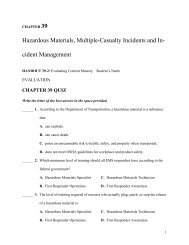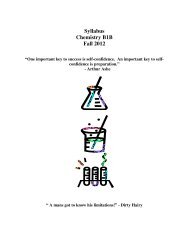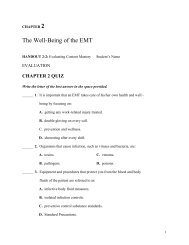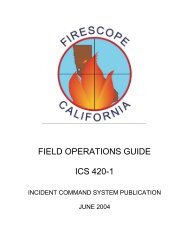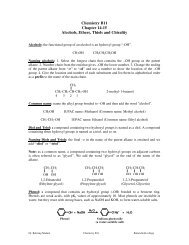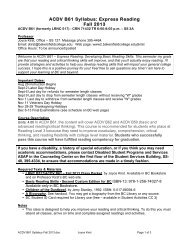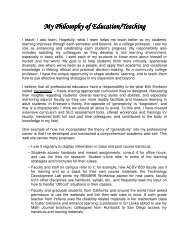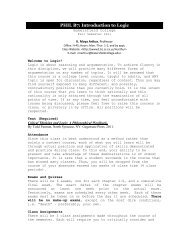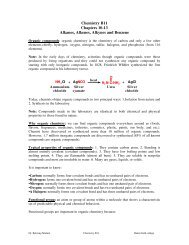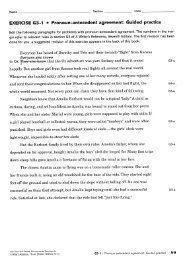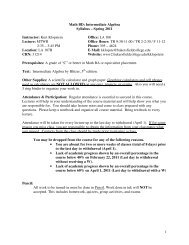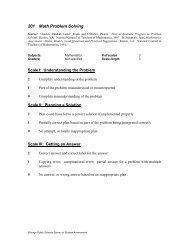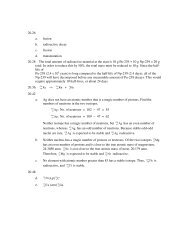View essay as PDF - Bakersfield College
View essay as PDF - Bakersfield College
View essay as PDF - Bakersfield College
You also want an ePaper? Increase the reach of your titles
YUMPU automatically turns print PDFs into web optimized ePapers that Google loves.
Hernandez 1Ventura HernandezProfessor WolfEnglish 5317 September 2013Grey Lines of an Immigrant"Some struggled to contain their joy; others were a bit apprehensive, <strong>as</strong> if doubtful oftheir newly accorded status until they could actually hold the Certificate of Naturalization in theirhands" (26). This is an observation made by Eva Paus in “Reflections of a New U.S. Citizen.” Inthe United States of America, there are many ethnic minority groups who have an illegal status.For some of them, it w<strong>as</strong> a conscientious choice to come here illegally, but a small minority hadthe choice made for them. I can't fathom the significance of what it is to be a “citizen” of thisgroup or what it's like to find oneself in the gallows of uncertainty. However, I can help paint itthrough the eyes of an illegal immigrant named Marianna. Marianna w<strong>as</strong> a citizen of theundocumented minority group here in America. As a “citizen” of this group, her “nationalanthem” contained the prospect of becoming a legal United States citizen. This meant thatthroughout her lifetime here in the United States, she strove for a more transparent concept ofgaining United States citizenship.The Wordsworth Concise English Dictionary defines citizenship <strong>as</strong> “the state of being orof having rights and duties of a citizen; conduct in relation to these duties.” In the early 1980's,Marianna illegally immigrated to the United States via the river on the shoulders of her nephew.
Hernandez 2Her heart w<strong>as</strong> beating furiously to compliment the fear that held itself like a shroud in thedarkness. Her family knew she w<strong>as</strong> weak and would not have made it in Mexico by herself.Marianna had always been weak and sickly, enabling her to only achieve a 3rd grade education.The moment she stepped foot on the other side and p<strong>as</strong>sed into California, the struggle of being acitizen of the undocumented ethnic minority group began. What is contained in these unspokencharters of rights and responsibilities? As an undocumented, she now had the responsibility topay back the favor her sister gave her by sending her son to help her illegally immigrate. Shealso had the responsibility to help earn money to pay for her room and board. In Mexico, she hadthe security of receiving medical care for her many ailments, but in the United States, going tothe doctor could possibly mean discovery of her illegal status.In every human being, there is a sense close to the nature of what our forefathers wrote inthe constitution. Marianna knew she had the right to be treated fairly and pursue the ticket tobecoming a legal citizen of the United States. In her lifetime, she became an undocumentedstatistic. She became a number in a group that keeps incre<strong>as</strong>ing and actively striving for a moretransparent concept of attaining legal citizenship through immigration reform. Marianna hadseveral chances to gain legal citizenship, but the loopholes and life took it away. As anundocumented, she could have gained citizenship through marriage to a U.S. citizen or legalresident, but due to her illegal entry, a fine had to be paid. The fine included monetarycompensation to INS and returning to Mexico until her paperwork w<strong>as</strong> approved. When shemarried, the monetary fine w<strong>as</strong> paid, but returning to Mexico proved a difficult thing to do at thattime. Her husband w<strong>as</strong> scheduled for heart surgery, and she w<strong>as</strong> reluctant to believe that shewould ever return.
Hernandez 3When questioned, Marianna would say her life <strong>as</strong> an undocumented here in the UnitedStates w<strong>as</strong> difficult. She w<strong>as</strong> here, but she didn't exist. She didn't have an identification, a socialsecurity number, a driver’s license, or medical care coverage. If she disappeared, the only peoplethat would realize her absence would be her family members. As an undocumented, how can yousurvive and be complacent with such a status? Ralph Ellison in Prologue from Invisible Manwrote, "I am an invisible man. No, I am not a spook like those who haunted Edgar Allen Poe; noram I one of your Hollywood-movie ectopl<strong>as</strong>ms. I am a man of substance, of flesh and bone, fiberand liquids---and I might even be said to possess a mind. I am invisible, understand, simplybecause people refuse to see me. Like the bodiless heads you see sometimes in circus sideshows,it is <strong>as</strong> though I have been surrounded by mirrors of hard, distorting gl<strong>as</strong>s. When they approachme they see only my surroundings, themselves, or figments of their imagination--indeed,everything and anything except me" (37). This quote, in relation to Marianna, exemplified herisolation <strong>as</strong> an undocumented “citizen” in the United States. She w<strong>as</strong> invisible, a figment of anunidentifiable population, a cumbersome burden examined inhumanely at times.Complacency and being undocumented do not go hand in hand. This cry from what usedto be a minority h<strong>as</strong> evolved into a roar of visibility. The undocumented are not e<strong>as</strong>ilymanipulated into the shadows like the p<strong>as</strong>t. We have activist like Cesar Chavez and DoloresHuerta, who made the invisible, visible by their campaigns and revelation of unjust truths. Thedebate of immigration reform w<strong>as</strong> such a strong campaign, that President Obama used it <strong>as</strong> partof his re-election platform. Current debate over immigration reform includes being partial tothose brought into the country <strong>as</strong> children. These children have had the right to an education, andwith education, evolves the gradual elevation of thinking. The community of undocumentedcitizens have had nothing handed to them for free. If you could <strong>as</strong>k Marianna if in her lifetime
Hernandez 5cl<strong>as</strong>sifying her <strong>as</strong> a white woman, he would have died from lack of oxygen. Even so, had webeen part of the undocumented cl<strong>as</strong>s, we still would have inalienable rights. According to ananswer written by Robert Longley for About.com, "When the Supreme Court decides c<strong>as</strong>esdealing with First Amendment rights, it typically draws guidance from the 14th Amendment'sprincipal of "equal protection under the law." In essence, the "equal proction" clause extendsFirst Amendment protection to anyone and everyone covered by the 5th and 14th Amendments.Through its consistent rulings that the 5th and 14th Amendments apply equally to illegal aliens,they also enjoy First Amendment rights."As a United States citizen, I believe it is the responsibility of the undocumented to correcttheir status. At this point we do need clarification on immigration due to the escalating cost ofhaving an elusive concept towards undocumentation. What h<strong>as</strong> been the invisible, h<strong>as</strong> incre<strong>as</strong>edproportionately over time. We have spent so much money to identify the unidentified in allconcepts of society. There have been some legislation that h<strong>as</strong> p<strong>as</strong>sed that trods over the rights ofUnited States citizens due to profiling. As a United States citizen, I refuse to travel throughArizona due to this profiling. This added expense does not only filter to the states but alsonationally where identification procedures have been revamped for voting. The l<strong>as</strong>t time I w<strong>as</strong>aware of regulations towards undocumented citizens voting, it w<strong>as</strong> not authorized nor granted.However, education is allowed, and it is on the tax payer’s dime until they enter college. It isthere that they are charged <strong>as</strong> foreign students. This, in comparison to resident’s tuition, is veryexpensive. As undocumented college students they do not qualify for federal financial aid,grants, work study, or loans.How is it costly to have a v<strong>as</strong>t undocumented community? It's reflected in taxes, poverty,crime, and medical costs. I can personally say that unpaid medical costs from undocumented
Hernandez 6citizens is incre<strong>as</strong>ing. President Obama's healthcare reform is said to fine those found withoutmedical coverage this coming year through taxes. How can you fine the unidentifiedundocumented citizen? Where does that unpaid cost filter to? How can you regulate this policyon this community? When I w<strong>as</strong> working back e<strong>as</strong>t <strong>as</strong> a surgical technician, the percentage ofundocumented who came for emergency care w<strong>as</strong> high. There w<strong>as</strong> many factors <strong>as</strong> to why theywaited until their condition became critical. One of the factors that many undocumented citizensshared w<strong>as</strong> the lack of medical coverage. Another w<strong>as</strong> the fear of being deported to Mexico. Thecost of debt is disproportionate when comparing two factors. It is like comparing a healthycheck-up versus hernia surgery. The debt left behind for the facility to absorb is greater. Thisdebt trickles down to the cost for other patients. When someone steals from a store, the cost ofthe item shoplifted trickles down to the consumer in cents. It is the same way in comparison tohaving vague immigration laws that do not address every issue.The grey lines of an undocumented immigrant h<strong>as</strong> become a super highway. Thedefinition of the undocumented h<strong>as</strong> evolved with the incre<strong>as</strong>e in their community. They nowhave a presence that h<strong>as</strong> infiltrated our looking gl<strong>as</strong>s of perception. Some of those citizens haveovercome many obstacles and achieved the American dream of becoming legal citizens like EvaPaus. Yet, there is also some who are like the description in Prologue from Invisible Man, andthey die being invisible. We have to <strong>as</strong>k ourselves, <strong>as</strong> United States citizens, what is the definingpoint that will allow us to reform our current policies? My defining point w<strong>as</strong> witnessingMarianna die at the county hospital. She had no identification, medical coverage, sense ofsecurity, or valuable <strong>as</strong>sets except her soul. Where is your demarcation line?
Hernandez 7Works CitedPaus, Eva. "Reflections of a New U.S. Citizen." Composing a Civic Life. Eds. Michael Berndtand Amy Muse. 2nd Ed. New York: Pearson, 2007. 25-26. Print.Ellison, Ralph. "Prologue from Invisible Man." Composing a Civic Life. Eds. Michael Berndtand Amy Muse. 2nd Ed. New York: Pearson, 2007. 25-26. Print.G.W. Davidson, M.A. Seaton and J. Simpson. The Wordsworth Concise English Dictionary.Great Britain: Wordsworth Editions Ltd., 1994. Print.Longley, Robert. Do Illegal Aliens Have Constitutional Rights?. About.com, n.d. Web. 9 Sep.2013.



